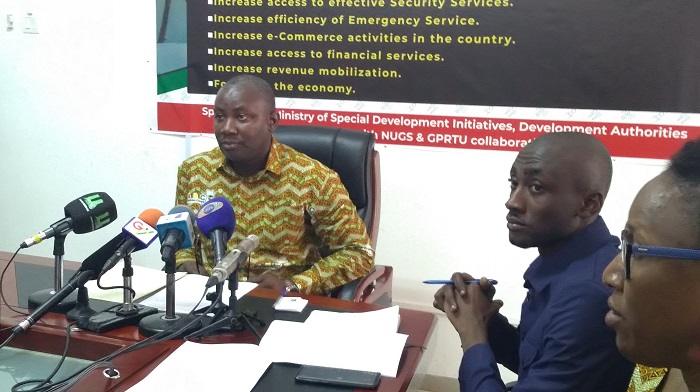Dr Ibrahim Anyars addressing the media
The Nation Builders Corp (NABCO) has deployed 12,750 trainees to undertake a nationwide ‘Property Address Tagging’ project.
The project announced recently would identify property with numbers and street names including digital addresses. The details would be fed into a data system and allowed for ease of identification of houses, among other advantages. The generated details would be captured on plates and affixed on the property at no cost to house owners.
The team deployed for the nationwide exercise consisted of 10,000 unplaced trainees and 2,750 from another segment of the programme. They would be expected to cover at least 4 million houses in the country. Fifty of the personnel would be expected to cover a district, with a 630-house target within six weeks.
Speaking at a press briefing in Accra yesterday, the Chief Executive Officer of NABCO, Dr Anyars Ibrahim, said his organisation is set to co-ordinate and train personnel on how to collect data, generate digital addresses and affix plates on property.
He presented a roadmap of the project which entails the training of personnel, collection of data, validation, as well as the approval for plate printing.
This is to be followed by a tagging exercise, quality assurance process and a completion and auditing process, after which the project would be handed over to metropolitan, municipal and district assemblies (MMDAs) one calendar month after tagging and quality assurance checks.
Dr Ibrahim also said the project would leverage on existing data gathered by other entities such as the Ghana Post Service GPS, MMDAs and Agric Census to develop a credible integrated system.
The project, which is to be fully executed by December 2019, is to be supported by a project committee made up of key stakeholders such as Office of the Vice-President, MMDAs, Ghana Post and Lands Commission.
Other members of the committee are Ministries of Information, Special Development Initiatives, Local and Rural Development and Communications.
The project is in line with the Street Naming and Property Addressing policy that was initiated by the government in 2011 which led to a directive issued in 2013 that required MMDAs to name all streets and number all properties within an 18-month period.
Expected outcomes of the current project include helping to formalise the economy, increase e-commerce activities in the country and improve efficiency of emergency services.
By Issah Mohammed


